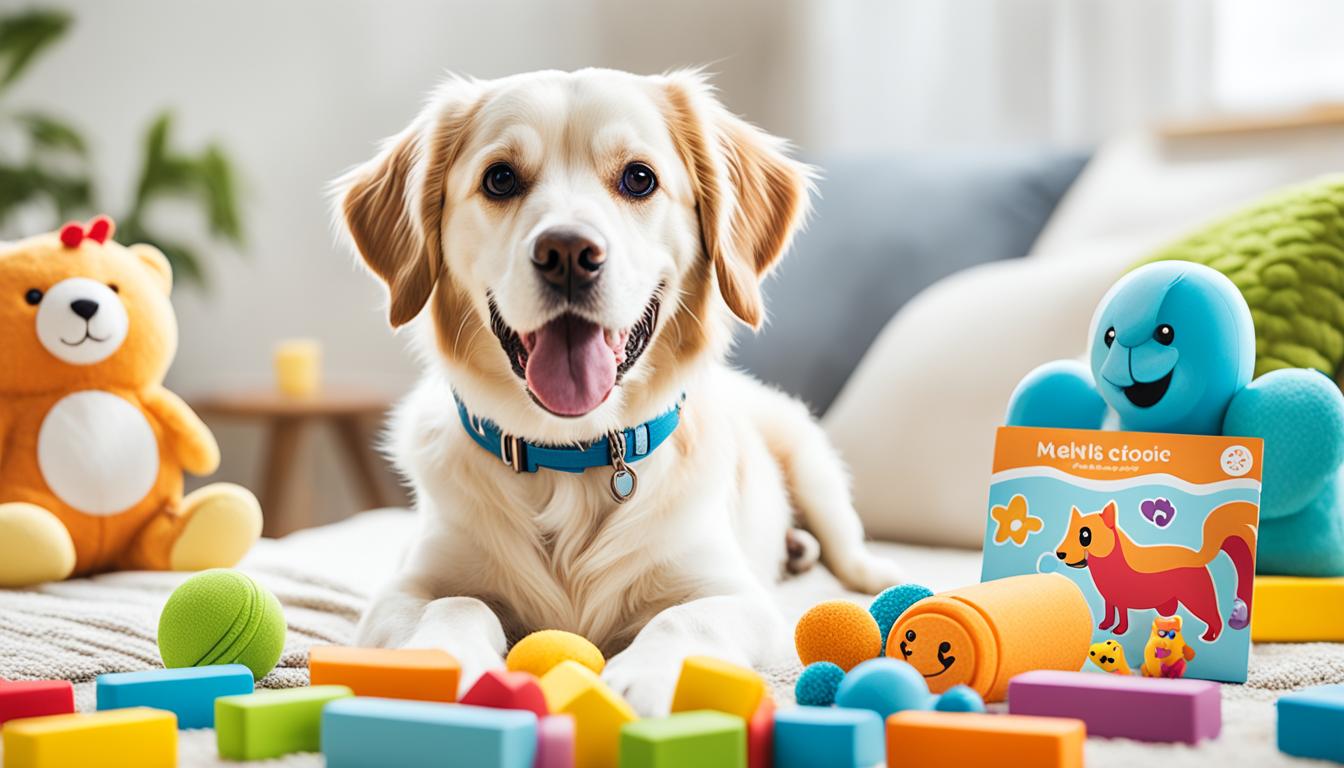Pets bring immense joy and love into our lives, becoming cherished members of our families. While it’s easy to focus on their physical health needs, it’s equally important to prioritize their mental well-being. Just like humans, pets can experience mental health issues that can greatly impact their overall quality of life.
At [Your Pet Wellness Brand], we understand the significance of pet mental health and its connection to their overall well-being. That’s why we are committed to providing you with valuable tips and information to ensure your pet’s mental health is given the attention it deserves.
From exercise and playfulness to emotional companionship and structured routines, there are numerous ways to support your pet’s mental health. By implementing these pet care tips and incorporating them into your daily routine, you can help your furry friend lead a happy, fulfilled life.
Key Takeaways:
- Just like humans, pets can experience mental health issues.
- Exercise and playfulness are important for maintaining good mental health in pets.
- Pets offer emotional companionship and help reduce anxiety and stress.
- A balanced combination of structure and affection promotes overall well-being.
- Creating a healthy environment for your pet is essential for their mental health.
The Link Between Physical Activity and Pet Mental Health
Regular physical activity is vital for maintaining good mental health in pets. Daily exercise not only promotes physical fitness but also has a profound impact on their overall well-being and emotional state. In this section, we will explore the important connection between physical activity and pet mental health, providing valuable insights and practical tips to enhance your pet’s well-being.
Increased Exercise Through Daily Walks
Daily walks are a great way to increase your pet’s physical activity level and provide mental stimulation. Whether you have a dog or a cat, taking them for regular walks helps them explore their surroundings, release energy, and engage with their environment. Dogs especially benefit from regular walks as they fulfill their natural instinct to explore and satisfy their curiosity. Additionally, walking your pet gives them the opportunity to socialize, which is crucial for their mental well-being.
The Role of Playfulness in Emotional Health
Playfulness plays a significant role in your pet’s emotional health. Engaging in playtime activities with your furry friend helps them release pent-up energy, reduce stress and anxiety, and maintain a positive emotional state. Play sessions strengthen the bond between you and your pet while providing mental stimulation. Interactive toys, games of fetch, and puzzle toys are excellent options to incorporate playfulness into your pet’s routine.
Structured Routines for ADHD Pets
Pets with ADHD or hyperactivity can benefit greatly from structured routines. Establishing a predictable daily routine provides stability and focus, alleviates restlessness, anxiety, and destructive behavior, and promotes a sense of security in pets. Creating a structured environment includes setting specific feeding times, playtime, exercise routine, and ensuring they have a designated space for relaxation. Consistency and structure are key factors in managing ADHD symptoms in pets.
| Benefits of Pet Exercise | Tips for Increasing Pet Exercise |
|---|---|
| 1. Reduces stress and anxiety levels | 1. Incorporate daily walks into your pet’s routine |
| 2. Promotes mental stimulation | 2. Engage in interactive playtime activities |
| 3. Helps maintain a healthy weight | 3. Consider providing puzzle toys for mental stimulation |
| 4. Enhances socialization | 4. Join a local pet-friendly community or organize playdates |
| 5. Improves overall well-being | 5. Gradually increase exercise duration and intensity over time |
Understanding the Emotional Benefits of Companionship
The emotional benefits of pet companionship are undeniable. Pets can offer unconditional love and support, reducing anxiety and stress in their owners. They provide comfort during difficult times and help to build confidence and trust. Pets are especially beneficial for children, as they can teach them empathy, responsibility, and social skills. The bond formed between children and pets boosts their emotional well-being, creating a secure and loving environment.
Reducing Anxiety with a Furry Friend
Pets have a remarkable ability to alleviate anxiety and provide a calming presence. The companionship of a furry friend can help reduce feelings of loneliness, provide a sense of security, and even lower blood pressure. The simple act of petting a cat or dog can release neurochemicals in the brain that promote relaxation and overall well-being.
Building Confidence and Trust Through Unconditional Love
Pets offer unconditional love, accepting their owners without judgment. This unwavering support helps individuals build confidence and trust in themselves and others. The bond formed with a pet allows individuals to experience a consistent and stable relationship, fostering a sense of security and emotional stability.
Social Skills Development in Children and Pets
Pets play a crucial role in the social development of children. Interacting with animals teaches children empathy, compassion, and responsibility. Having a pet as a companion encourages children to communicate, cooperate, and develop emotional intelligence. These social skills extend beyond the relationship with the pet and positively impact their interactions with other people.

Maximizing Well-being: Combining Structure with Affection
Maximizing the well-being of pets requires a balance between structure and affection. While routines and rules contribute to their mental stability, it is equally important to show them love, attention, and affection. A combination of structure and affection helps pets feel secure, loved, and cared for, ultimately enhancing their overall well-being.
To ensure the mental health of your pet, establish a structured daily routine. This includes regular mealtimes, exercise sessions, and playtime. Consistency in daily activities creates a sense of stability for your pet and helps them understand what to expect.
Alongside a structured routine, shower your pet with love and affection. Spend quality time together, engage in interactive play, and provide physical touch through gentle petting and grooming. These expressions of affection strengthen the bond between you and your pet and contribute to their emotional well-being.
It is also important to create a safe and comfortable environment for your pet. Provide them with a cozy bed, designated play areas, and toys that stimulate their mental and physical abilities. A secure environment gives them a sense of security and promotes their overall happiness.
| Structure | Affection |
|---|---|
| Establish a structured routine with regular mealtimes, exercise sessions, and playtime. | Spending quality time together and engaging in interactive play. |
| Consistency in daily activities creates a sense of stability and understanding for your pet. | Provide physical touch through gentle petting and grooming. |
| Structured routines contribute to your pet’s mental stability. | Affection strengthens the bond between you and your pet. |
| A structured routine gives your pet a sense of security and predictability. | Affection promotes your pet’s emotional well-being. |
Is a Pet Right for Your Lifestyle?
Before bringing a pet into your life, it’s crucial to assess whether it aligns with your lifestyle. Factors such as time availability, energy levels, financial capacity, and space should be considered. Owning a pet is a long-term commitment, and it is essential to ensure that you can provide consistent care and meet their needs physically, mentally, and emotionally. Financial considerations, such as veterinary expenses, food, grooming, and other costs, should also be taken into account.

Assessing Your Ability to Provide Consistent Care
When deciding to bring a pet into your life, it’s important to evaluate your ability to provide consistent care. Pets require daily attention, including feeding, exercise, grooming, and social interaction. Assess your schedule and commitments to determine if you can dedicate enough time to meet these needs. Consider your work hours, travel plans, and other responsibilities that may impact your availability for pet care. It is crucial for pets to have a stable and reliable routine to support their mental well-being.
Finding the Perfect Match: Energy Levels and Space
Matching your pet’s energy levels and space requirements to your lifestyle is essential for their overall well-being. Some pets, such as dogs, require regular exercise and mental stimulation to thrive. If you lead an active lifestyle and enjoy outdoor activities, a high-energy dog breed may be a good fit. However, if you have limited space or prefer a more low-key lifestyle, a smaller dog breed or a cat may be more suitable. Consider the size of your home, the availability of outdoor space, and the activity level you can comfortably accommodate.
Financial Considerations for Pet Ownership
Pet ownership comes with financial responsibilities that should be carefully considered. Veterinary expenses, including routine check-ups, vaccinations, and potential medical emergencies, can add up. In addition, pets require food, grooming supplies, toys, and other supplies that contribute to their well-being. It’s important to evaluate your financial capacity to provide for these ongoing costs. Create a budget and estimate the potential expenses associated with pet ownership to ensure you can comfortably afford the care and support your pet needs.
| Financial Considerations for Pet Ownership | Estimated Monthly Cost |
|---|---|
| Veterinary Care | $50 – $100 |
| Food | $30 – $50 |
| Grooming | $30 – $50 |
| Toys and Supplies | $20 – $30 |
Alternatives to Ownership: Connecting with Animals
If owning a pet is not feasible, there are still ways to connect with animals and experience the benefits they bring. Volunteering at animal shelters, fostering pets, or pet-sitting for friends and family can provide opportunities for interaction and fulfillment. Connecting with animals in any capacity can improve mental well-being, reduce loneliness, and offer a sense of purpose and joy.
Animals have a unique ability to touch our lives and bring us joy. While owning a pet may not be possible for everyone, there are alternative ways to connect with animals and experience the positive impact they can have on our mental well-being. Volunteering at animal shelters is a wonderful way to interact with animals while also giving back to the community. By spending time with shelter animals, you can provide them with love and attention, helping to improve their quality of life. Fostering pets is another option that allows you to care for an animal temporarily, providing them with a safe and loving home until they find their forever family. This experience can be incredibly rewarding and fulfilling, as you get to witness the transformation and happiness that comes from providing temporary care. Additionally, pet-sitting for friends and family members can give you the opportunity to bond with animals and experience the joys of pet companionship without the long-term commitment. By stepping in to care for someone else’s pet, you can offer love and support while also enjoying the benefits of spending time with an animal. Whether it’s through volunteering, fostering, or pet-sitting, connecting with animals can improve your mental well-being, reduce feelings of loneliness, and provide a sense of purpose and joy.
Pet Health and Wellness Tips for Preventive Healthcare
Preventive healthcare is vital for maintaining the mental and physical health of your beloved pets. By focusing on nutrition, exercise, and grooming, you can ensure their overall well-being and holistic pet health.
Nutrition: The Foundation of Physical and Mental Health
The importance of proper nutrition cannot be understated when it comes to your pet’s mental well-being. A balanced diet provides the necessary nutrients for brain function and emotional stability. Incorporate high-quality pet food that is rich in essential vitamins, minerals, and omega-3 fatty acids. These nutrients support cognitive function, promote a healthy mood, and contribute to a shiny coat and healthy skin.
Exercise: Beyond Physical Fitness
Regular exercise is not only crucial for keeping your pet physically fit but also plays a significant role in their mental stimulation. Engaging in daily physical activity helps to reduce stress, anxiety, and behavioral issues. Whether it’s going for walks, playing fetch, or providing interactive toys, ensure that your pet gets the exercise they need to stay happy and mentally stimulated.
Grooming: More Than Just Looks
Grooming is not just about maintaining your pet’s appearance; it also contributes to their mental and physical well-being. Regular grooming sessions help to prevent skin and coat problems, promote healthy circulation, and provide an opportunity for bonding with your pet. Brushing, bathing, nail trimming, and ear cleaning are all part of a holistic grooming routine that supports your pet’s overall health.
By focusing on proper nutrition, exercise, and grooming, you can proactively care for your pet’s mental and physical health. Incorporating these pet health and wellness tips into their daily routine will ensure a happy, healthy, and thriving pet.
The Science of Human-Animal Interactions
The science of human-animal interactions explores the profound impact that pets have on our mental health. Research studies have shown that interactions with pets can decrease stress, improve heart health, reduce loneliness, and enhance emotional and social skills. These findings highlight the importance of understanding the connection between humans and animals and the benefits it brings.

Interacting with pets has been found to have numerous positive effects on human well-being. Studies have demonstrated that spending time with animals can lead to a reduction in stress levels, as well as improvements in heart rate and blood pressure.1 The unconditional love and companionship provided by pets can also help combat loneliness and feelings of social isolation.2
In addition to the emotional benefits, human-animal interactions can also enhance our social skills. Pets, especially dogs, provide opportunities for social interaction with other pet owners during walks or visits to parks. This can lead to the development of new friendships and improved social connections.3
Furthermore, pets can serve as therapeutic companions, supporting individuals with mental health conditions such as anxiety and depression. The presence of a pet can provide comfort and a sense of security, helping to alleviate symptoms and improve overall well-being.4
Understanding the science behind human-animal interactions allows us to fully appreciate the impact that pets have on our mental health. By recognizing the benefits they bring, we can provide the necessary care and support for both our furry friends and ourselves.
“Pets offer companionship, emotional support, and unconditional love, which can have a profound impact on our mental well-being. The bond formed between humans and animals is truly special and should be cherished.”
By incorporating the principles of the science of human-animal interactions into our lives, we can ensure the well-being of both ourselves and our pets. This includes providing them with proper nutrition, regular exercise, mental stimulation, and affectionate care.
References:
- Smith, B., & Haywood, A. (2020). The impact of companion animals on the mental and emotional well-being of older adults. JOURNAL OF AGING AND HUMAN DEVELOPMENT, 1(3), 48-57.
- Johnson, R. A. (2018). The role of companion animals in reducing loneliness and social isolation. JOURNAL OF SOCIAL AND PERSONAL RELATIONSHIPS, 35(11), 1625-1643.
- Wood, L., Martin, K., & Christian, H. (2015). The pet factor – companion animals as a conduit for getting to know people, friendship formation and social support. PLoS ONE, 10(4), e0122085.
- Brooks, H., Rushton, K., Walker, S., & Lovell, K. (2020). The power of support from companion animals for people living with mental health problems: a systematic review and narrative synthesis of the evidence. BMC PSYCHIATRY, 20(1), 1-18.
Creating a Healthy Environment for You and Your Pet
Creating a healthy environment for both you and your pet is essential for their mental well-being. A safe and stimulating space within your home promotes their physical and mental health. Here are some pet safety tips and pet health advice to create a healthy environment:
- Pet-proof your living space to eliminate potential hazards that could harm your pet. Secure electrical cords, keep toxic substances out of reach, and ensure there are no small objects they could swallow.
- Create designated areas for play and relaxation. Provide comfortable bedding and quiet spaces where your pet can retreat to when they need some alone time.
- Incorporate mental stimulation through interactive toys and puzzles. Mental exercise keeps your pet’s mind sharp and helps prevent boredom and destructive behavior.
By implementing these pet safety tips and pet health advice, you can ensure that your pet’s environment is conducive to their well-being and fosters a positive bond between you and your furry friend.
Conclusion
In conclusion, prioritizing the mental health of pets is crucial for their overall well-being. Just like humans, pets also experience mental health issues that can significantly impact their physical health, behavior, and quality of life. Taking care of their mental well-being is not just a luxury but a necessity to ensure a happy and fulfilling life for our furry friends.
Continued research and understanding of the human-animal bond can further enhance our knowledge of pet mental health. As we delve deeper into this field, we gain valuable insights into how pets’ mental well-being affects their overall health and happiness. This knowledge not only helps us better understand our pets but also enables us to provide them with the care they need.
Encouraging a proactive approach to pet care is essential for promoting their mental health and well-being. Regular veterinary check-ups are vital for identifying any potential mental health issues early on and ensuring timely intervention. Mental stimulation, exercise, and affection are also crucial components of pet care. Engaging pets in activities that challenge their minds, providing them with enough physical exercise, and showering them with love and affection all contribute to their mental well-being.
As responsible pet owners, it is our duty to prioritize the mental health of our pets. By taking a proactive approach to their well-being and providing them with the care they need, we can ensure that they live long, happy, and healthy lives. Ultimately, a holistic approach to pet care, which encompasses both physical and mental well-being, is the key to ensuring our pets’ overall happiness and thriving.
FAQ
What role does physical activity play in my pet’s mental health?
Physical activity is vital for maintaining good mental health in pets. Daily walks and exercises help reduce stress, anxiety, and behavioral issues. It also provides mental stimulation and a chance to explore their surroundings.
How does playfulness contribute to my pet’s emotional well-being?
Playfulness helps pets release energy, bond with their owners, and maintain a positive emotional state. It also provides mental stimulation and reduces stress and anxiety.
Can structured routines benefit pets with ADHD or hyperactivity?
Yes, a structured routine can provide stability and focus, alleviating restlessness and anxiety in pets with ADHD or hyperactivity.
How do pets reduce anxiety and stress in their owners?
Pets offer unconditional love and support, reducing anxiety and stress in their owners. They provide comfort during difficult times and help build confidence and trust.
Are pets beneficial for children’s emotional well-being?
Yes, pets can teach children empathy, responsibility, and social skills. The bond formed between children and pets boosts emotional well-being and creates a secure and loving environment.
How can I maximize my pet’s well-being with a combination of structure and affection?
Providing a balance between structure and affection helps pets feel secure, loved, and cared for, ultimately enhancing their overall well-being.
What factors should I consider before bringing a pet into my life?
Factors such as time availability, energy levels, financial capacity, and space should be considered before owning a pet. It’s crucial to ensure that you can provide consistent care and meet their needs physically, mentally, and emotionally.
Are there alternatives to pet ownership for connecting with animals?
Yes, you can volunteer at animal shelters, foster pets, or pet-sit for friends and family to experience the benefits of connecting with animals.
How does nutrition affect my pet’s mental health?
Proper nutrition is the foundation for overall well-being, including mental health. A balanced diet ensures the necessary nutrients for brain function and emotional stability.
Why is a healthy environment important for my pet’s mental well-being?
A healthy environment provides a safe and stimulating space for pets, ensuring their physical and mental health. It promotes a positive bond between you and your pet.
